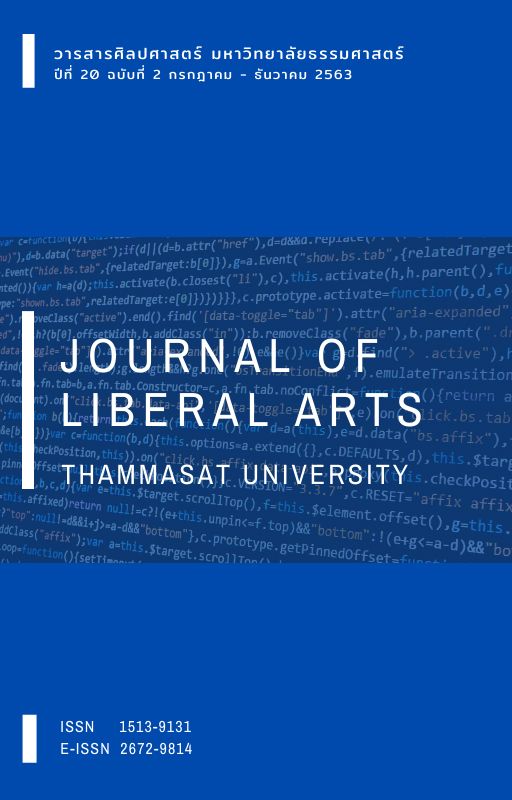Social Media Influencers and Thai Tourism Industry: Tourists’ Behavior, Travel Motivation, and Influencing Factors
Main Article Content
บทคัดย่อ
Social Media Influencers (SMIs) have become an important feature in various business activities, including tourism. However, very few studies have investigated the role of SMIs in the tourism industry in Thailand. This study aims to explore the impact of SMIs on the Thai tourism industry, focusing on two major research focusses: influences of SMIs on Thai tourists’ behavior and travel motivation; and factors of SMI marketing that influences such behavior and travel motivation. To accomplish such goals, we used a mixed-method design in which the data were collected from two major sources: an online questionnaire responded to by 155 participants, and qualitative interviews with eight informants using phone calls. The results showed that most participants (92.30%) have been influenced by SMIs on travel decision-making. Also, among the nine factors influencing tourists’ behavior and their travel motivation, participants preferred to seek travel information from tourism influencers with experience and expertise in certain inclusive information (M = 3.47) and from those with credibility (M = 3.37). The findings also indicate the roles that social media influencer marketing takes on a number of aspects in various business sectors, including the tourism industry in Thailand. The findings suggest that social media influencers create significant impacts on consumers’ decision-making in the tourism sector, in which most tourists tend to search for reviews or useful information from SMIs regarding travel plans in order to avoid terrible travel experiences.
Downloads
Article Details
เอกสารอ้างอิง
Alic, A., Pestek, A., & Sadinlija, A. (2017). Use of Social Media Influencers in Tourisms. TRADE PERSPECTIVES 2017: Specialization and Customer Centered Retailing. Retrieved from https://www.academia.edu/37187190/USE_OF_SOCIAL_MEDIA_INFLUENCERS_IN_TOURISM
Bokunewicz, J. F., & Shulman, J. (2017). Influencer identification in Twitter networks of destination marketing organizations. Journal of Hospitality and Tourism Technology, 8(2), 205–219.
Chatzigeorgiou, C. (2017). Modelling the impact of social media influencers on behavioural intentions of millennials: The case of tourism in rural areas in Greece. Journal of Tourism, Heritage & Services Marketing, 3(2), 25-29.
Clement, J. (2020). Number of global social network users 2010-2023. Statista. Retrieved from https://www.statista.com/statistics/278414/number-of-worldwide-social-network-users/
Creswell, J. (2005). Educational research: planning, conducting, and evaluating quantitative and qualitative research (2nd ed.). Pearson Education.
De Veirman, M. (2017). Marketing through Instagram influencers: the impact of number of followers and product divergence on brand attitude. Retrieved from https://doi.org/10.1080/02650487.2017.1348035
Denzin, N. K. (1984). The research act. Englewood Cliffs, NJ: Prentice Hall.
Denzin, N. K., & Lincoln, Y. S. (1998). The landscape of qualitative research: Theories and issues. Thousand Oaks, CA: Sage.
Djafarova, E., & Rushworth, C. (2017). Exploring the credibility of online celebrities' Instagram profiles in influencing the purchase decisions of young female users. Computers in Human Behavior. Retrieved from https://doi.org/10.1016/j.chb.2016.11.009
Fink, A. (2013). How to conduct surveys: A step-by-step guide. SAGE Publications, Inc.
Freberg, K., Grahamb, K., McGaughey, K., & Freberg, L. (2010). Who are the social media influencers? A study of public perceptionsof personality. Public Relations Review. Retrieved from https://doi.org/10.1016/j.pubrev.2010.11.001
Gerritsen, R., & Zeng, B. (2014). What do we know about social media in tourism? A review. Tourism Management Perspectives. Retrieved from https://doi.org/10.1016/j.tmp.2014.01.001
Glover, P. (2009). Celebrity Endorsement in Tourism Advertising: Effects on Destination Image. Journal of Hospitality and Tourism Management, 16(1), 16-23.
Gorry, G. A., & Westbrook, R. A. (2009). Academic research: Winning the Internet confidence game. Corporate Reputation Review, 12(3), 195-203. Retrieved from https://doi.org/10.1057/crr.2009.16
Gretzel, U. (2018). Influencer marketing in travel and tourism. Advances in Social Media for Travel, Tourism and Hospitality: New Perspectives, Practice and Cases. 147-156. Retrieved from https://www.academia.edu/37112102/Influencer_Marketing_in_Travel_and_Tourism
Glaser, B. G., & Strauss, R. S. (1976). The discovery of grounded theory: Strategies for qualitative research. Chicago: Aldine.
IZEA Worldwide Inc. (2020). 67% of Social Media Consumers Aspire to be Paid Social Media Influencers. Retrieved from https://apnews.com/Globe%2520Newswire/39312e45ee2a748049cbd1ec4862b6e3
Maxwell, J. A. (1996). Qualitative research design: An interactive approach. Retrieved from https://www.researchgate.net/publication/320353627_Qualitative_research_design_An_interactive_approach
Medium. (2019). Mega-, macro-, micro- and nano-influencers — What’s the difference, and which should you use for your brand? Retrieved from https://medium.com/@vujenny/mega-macro-micro-and-nano-influencers-whats-the-difference-and-which-should-you-use-for-9839bb3055ae
Meriam, S. B. (1988). Case study research in education: A qualitative approach. San Francisco, CA: Jossy- Bass.
Nam, L. G., & Dân, H. T. (2018). Impact of Social Media Influencer Marketing on Consumer at Ho Chi Minh City. The International Journal of Social Sciences and Humanities Invention, 5(05), 4710-4714.
Terttunen, A. (2017). The Influence of Instagram on Consumers’ Travel Planning and Destination Choice. Retrieved from https://www.theseus.fi/bitstream/handle/10024/129932/Terttunen_Anna.pdf?sequence=1
The Nation. (2018, September 27). 3 Thai cities ranked among top 20 global destinations. The Nation Thailand. Retrieved from https://www.nationthailand.com/lifestyle/30355333
Uwandu, N. F., & Mohd, F. (2013). A Study of the Impact of Social Media in Social Commerce Using Twitter as a Case Study. Retrieved from https://www.researchgate.net/publication/257933151_A_STUDY_ON_THE_IMPACT_OF_SOCIAL_MEDIA_IN_SOCIAL_COMMERCE_USING_TWITTER_AS_A_CASE_STUDY
Uzunoǧlu, E., & Misci Kip, S. (2014). Brand communication through digital influencers: Leveraging blogger engagement. International Journal of Information Management, 34(5), 592–602.
Woods, S. (2016). The Emergence of Influencer Marketing. University of Tennessee Honors Thesis Projects. Retrieved from https://trace.tennessee.edu/utk_chanhonoproj/1976


